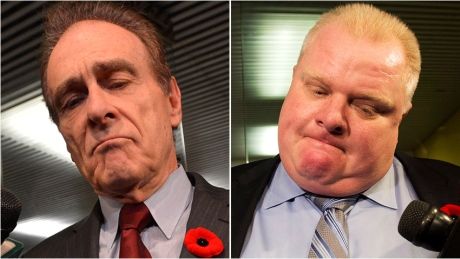Reports
You are here
Toronto city council restricts Ford, preserves his agenda

November 19, 2013
Toronto's City Council stripped Mayor Rob Ford of some of his powers. But because the council's decision aimed to punish Ford individually—transfering power to his right-wing ally Norm Kelly—it does not present a solution to "save Toronto" because the council's agenda remains fiscally conservative.
A full house chamber and local, national and international media were waiting for the council’s decision. Councilors voted 41-2 to take away Ford's ability to manage the city's emergencies and to pass the emergency management duties to his deputy. The council also voted 39-3 to strip Ford of his duties to appoint and remove committee chairs, and then voted to reduce his staff and office budget. The council has no authority to remove Ford but he will continue in his position with limited power.
Ford’s bogus defense
Ford said he will challenge the council's decision in court. Despite cutting and privatizing services, Ford claimed the move to restrict his power is an attack on people in Toronto. "I ask the councilors to think about the taxpayers in this situation." He said he took responsibility for his behaviour, but made no reference to his policies that have harmed thousands.
Councilor Doug Ford defended his brother during the meeting, claiming the motions were undemocratic and that the people of Toronto would come to the mayor’s defense next election. "The reason why we have elections is to elect people who can run the city. On October of next year , the people will decide." The claim that any mayor “runs the city” ignores the tens of thousands of city workers upon whose labour the city depends, and whose jobs Ford has attacked. It also implies that once someone is elected they can do whatever they want with no restrictions or accountability other than votes in a ballot box every few years.
Councilor Giorgio Mammoliti, Ford’s ally, boycotted the meeting and lashed out at the councilors' motions as a coup against Ford. He correctly called out the opportunism of some councilors (like Denzil Minan-Wong and Karen Stintz) who are attacking Ford to clear their own way to the mayoralty, but also lashed out at "the extreme left" and claimed that the councilors opposed to Ford "did more harm than any other dictatorship in the world."
Left councilors
The left on council were divided. Some supported the motion because of Ford’s personal behaviour. As Adam Vaughan said, “We will shun him, curtail his power as best we can. He clearly has gone off the deep end, shot himself in outer space.” This reinforces the stigmatization of people with addictions, deflects attention from Ford’s policies that deserve far more shunning from council, and ignores that these policies were not possible without support from a majority on council.
Others opposed the motions, not to draw attention to his policies but to preserve the mayoralty. Councilor Anthony Perruzza warned that if the council takes an action against Ford's “individual behaviour,” there is a risk that council members will use this as an excuse in the future to condemn others for their "political beliefs." He also echoed Ford’s defense by claiming that "you win an election for a mayor, you stay mayor. That is the will of the people." Left councilor Gord Perks made the same argument in an open letter: “Anything that displaces the electorate’s power to chose its government is anti-democratic… Government is the tool we built together to solve problems. Its precise function is to find alternatives that bring us to a better future.”
But Ford rose to power on people’s anger at the economic crisis and disillusionment with social democracy’s capacity to provide an alternative—including left councilors joining the attack on city workers and supporting the police’s crackdown during the G20.
Outside Council
It was pressure from outside council, through a year of mobilizing, that undermined Ford’s hold on council—causing rifts in the right-wing and confidence in left councilors to speak out. Taking advantage of the current low level of struggle, the media and right-wing councilors have tried to reduce opposition to Ford to his personal behaviour, in order to preserve his austerity agenda.
“Save Toronto,” the group that organized a rally outside council and collected more than 1000 signatures calling on Ford to resign, have reflected the moralism that blames Ford for drug use but not his policies. But despite the confused messaging, much of the opposition to Ford is because of his policies. While the council stripped Ford of his powers his agenda remains, but so does anger to it—which can be refocused by reminding people of Ford’s policies, the complicity of right-wing councilors, and the mobilizations that opposed his agenda and pushed left councilors to speak out.
Join the discussion: come to the forum “Conservatives, Corruption and Capitalism,”Tuesday, November 26, 7pm at OISE (252 Bloor St West), Toronto
Section:









